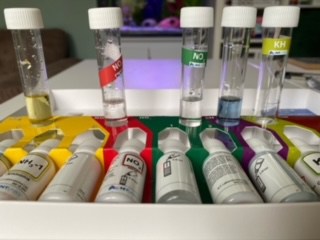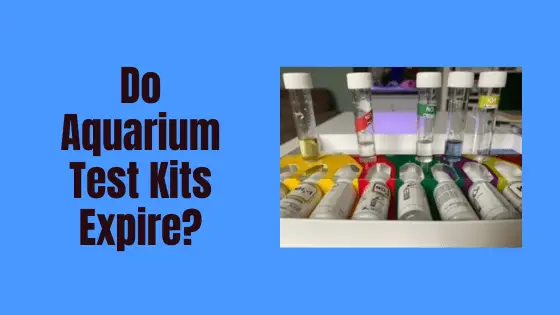Aquarium test kits provide easy-to-use methods for checking the chemical content of aquarium water. Proper storage and use of aquarium products ensures confidence in the test results. If we can’t trust the test results, we can’t be sure our fish tank is a healthy environment for our fish.
Aquarium test kits expire and it’s imperative for good aquarium water chemistry that chemicals are up to date and stored according to manufacturer instructions.
In this article, we will dig deeper into what these kits are and why proper storage is important. We will also look at different kit types, how long they last, and whether or not using expired products is a good idea.
What Is an Aquarium Test Kit?

An aquarium test kit is a set of chemical reagents made to check specific chemical parameters in aquarium water to ensure marine life viability. They ensure good water chemistry to keep your fish happy.
For example, chlorine disinfects tap water, but it is fatal to fish and can damage aquarium filters.
The user collects one or more water samples from the aquarium in a water sample tube. A chemical reagent is then added to the sample to create a reaction. The reaction between the water and reagent causes the sample to change colours. The user then compares the colour of the sample to standards on a chart.
Knowing the water chemistry is essential for proper aquarium maintenance, and aquarium test kits provide the tools to check.
Liquid Kits & Dry Strip Kits.
There are two testing kit reagent options: liquid reagent kits and dry strip reagent kits.
Liquid Reagent Kits
Liquid reagent kits use liquid reagents that are dropper-dosed into individual water samples. Each chemical test is run one at a time, using a different water sample for each test.
According to Wikipedia, a reagent is a substance or compound added to a system to cause a chemical reaction, or to test if one occurs. This usually happens by a colour change if another substance is detected. Liquid reagent just means it is in liquid form.
A basic liquid kit contains:
- Water sample collection tube
- One bottle of liquid reagent
- Colour-coded parameter chart to compare sample reaction colour
- Instructions for use
Dry Strip Reagent Kits
Dry strip reagent kits use strips of paper lined with multiple reagent pads per strip. The user dunks a single strip directly into the water sample, which causes reactions with all reagent pads at one time. Different strips test for different parameters and may not check everything.
A basic dry strip kit consists of:
- Container of strips
- Instructions for use
Water Chemistry Parameters that are Checked.
Different test kits check for different parameters, depending on the water supply and animal needs. According to Aquarium Info, below are the main water chemistry parameters checked by aquarium kits:
- pH — acidity or alkalinity
- Ammonia — produced by fish waste, food leftovers, and decaying plants
- Nitrites — toxic waste from ammonia breakdown
- Nitrates — converted nitrites
- KH Water Hardness — carbonate content
- GH Water Hardness — calcium and/or magnesium content
How Long Do Aquarium Test Kits Last?
The shelf life of test kits designates how long the kits’ chemicals keep their potency or efficacy in their original, sealed condition. The shelf life expiration date comes stamped on the kits’ containers or printed on their labels.
Aquarium test kits last around 3-5 years if they have liquid reagents. Strip test kits usually expire in two years if they’re unopened. The shelf life of unopened test kit containers is longer than the use-by life of opened kit containers.
Testing kit packaging supplies the expiration date, indicating how long the reagents retain potency in their unopened, sealed state from the date of manufacture. Once the reagents are opened and exposed to air, they begin oxidising, weakening them. Use-by instructions are often provided with expiration dates to indicate how long opened products will last.
Testing kits containing liquid reagent bottles have longer use-by lives than kits containing strips because the strips are stored together in one large group. Every time a user opens a strip container, the air contacts all the strips.
Reagent bottles are individually sealed, except for a small dispensing hole at the top. The reagents inside receive better protection from the elements than the strips and therefore have longer expiration periods.
Is It Safe To Use an Expired Aquarium Test Kit?
It is not safe to use an expired aquarium test kit because the chemical reagents lose their potency over time, precluding test result certainty. Without knowing the exact parameters, it isn’t possible to determine if the water is safe for marine life.
For example, these convenient SJ WAVE 6-in-1 Aquarium Test Strips on Amazon.com have a 2-year expiration period but expire quicker once opened. SJ Wave customer service explains: “The expiration date is stamped on the bottom of the package and is up to 2 years since manufacturing. We recommend using the testing strips inside an open package within 3 months for accurate results,” (this was in response to a question on Amazon.com).
The API Fishcare site provides material safety data sheets for the reagents in their testing kits. These sheets contain proper chemical storage information to prolong potency.
According to the Nano-Reef.com forums, Gary Jones—Manager of Corporate and Scientific Affairs for Mars Fishcare said that: “All test kits have a shelf life in which the chemicals degrade. No competitor can say that a test kit will read correctly forever.”
Does Fish Tank Water Conditioner Expire?
Fish tank water conditioner expires, becoming ineffective at removing harmful chemicals from your water. If the water conditioner loses its potency, it becomes less effective at removing chlorine, and harmful chemicals remain in the aquarium water.
According to FishLab, there are four types of fish tank water conditioners:
- Products for chlorinated water
- Products for chloraminated water
- Complete conditioners for removing most or all toxins
- Reverse-osmosis water helps to decontaminate the water
These are for use in freshwater aquariums only.
Chlorinated water requires sodium thiosulfate, which dechlorinating conditioners have. Chloraminated water requires sulphates, which dechloraminating conditioners have. (Ask your water utility provider to determine how they treat your tap water.)
None of these products lasts indefinitely. All types of conditioner most often have an expiration date printed on the bottle. All of them lose their potency over time.
While no way exists to extend the conditioner’s life, proper storage ensures it will retain potency through the expiration date.
If you have a conditioner that’s expired or possibly expired and want to check its potency, you can use a chlorine testing kit for swimming pools to check water samples before and after conditioner use. The test will give total chlorine parameters but will not tell you how much of the total is free chlorine or chloramines. User error and accuracy uncertainty undermine this test method’s dependability, however.
For the most accurate results, you can use a digital chlorine colorimeter, which reads the colour of a water sample using a light beam passed through the sample to provide a digital readout of the colour values.
Conclusion.
Proper water chemistry is crucial for aquarium life. Water testing kits provide accurate parameters, but their accuracy diminishes over time because the chemical reagents used in the kits degrade.
Conditioners lose their potency with age because their chemicals degrade as well. Once opened, testing kits and water treatments age faster. Therefore, you must use them within manufacturer-supplied timeframes.


